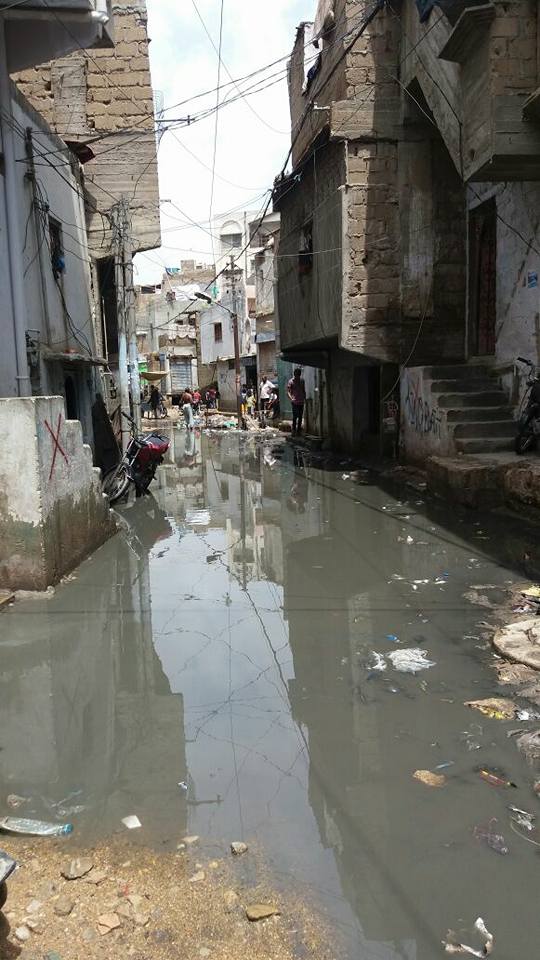A spike in the number of infections for waterborne and mosquito-borne diseases amongst the Christian victims of the recent floods in Pakistan,
has been blamed on the poor sewage system in deprived Christian communities.
On 31st August 2017 Pakistan also joined a list of countries such as India, Bangladesh and Nepal in what has now been described as the largest
flood to hit the South Asian continent. Over 1200 people were killed throughout the region with at least 25 dead on the last count for Pakistan.
People were killed through drownings as they were caught up in the powerful water currents of the deluge and others were electrocuted as Pakistan’s
unsafe external power cables became a significant hazard. Millions of Pakistani’s were made temporarily homeless. For some victims however the
floods have left an even greater concern.
In Essa Nagri a large well known Christian enclave in Pakistan blocked sewers caused flood waters to be retained for an exceptionally long period.
The resulting mix of effluence within the deluge water is believed to have caused a huge increase in the number of reported infections for the
many water- related diseases that are still rife in Pakistan.
Water related diseases in Pakistan:
- Bacterial diseases. Cholera. E.coli infection. Dysentery. Salmonellosis (Salmonella) Typhoid fever.
- Viral Infections. Adenovirus infection. Gastroeneritus. Hepatitis A. Polio. Dengue Fever. West Nile Fever. Protozoa.
- Parasitic Diseases. Amoebiasis. Cryptosporidiosis. Cyclosporiasis. Giardiasis (Giardia) Helminths.
In particular a noticeable rise in Dysentery, Cholera and Dengue fever has created a sense of great fear amongst the already beleaguered Christians.
BPCA are hoping to send in a medical team to undertake medical examinations and provide free treatment. We are finding that many individuals with symptoms are reporting illnesses late to avoid charges they cannot afford. We need to raise £2000 for a fully equipped competent medical team for three days duration across flood ravaged areas. The team will undertake free medical check-ups, will provide free vaccines and treatments and will provide advice on better health. If you would like to donate towards this essential work please (click here),
In one area of Essa Nagri images of a local sewage worker clearing a blocked sewer illustrated the preventable retention of floodwater that exacerbates
the threat of illness. Moreover it also highlighted the dangerous work practices for Pakistan’s sewage workforce who work without any PPE or specialist
equipment – most of whom are Christian. Only recenty two widows of sewage workers recently killed in workplace accidents, launched a campaign to
change the working conditions and terms of employment for the Pakistani sewage workforce (click here).


On 2nd Ocober 2017 two days after the worst of the floods hit the Christian community of Essa Nagri, our Karachi-based officer Yelson Wilson visited
the area to help with some food parcels. He visited Gospel Grace Church were many survivors were seeking refuge. Yelson, said:
will not return to their homes for some days.
been extremely sick with cases of diarrhea and fever extremely common. Already several victims have contracted Denge fever this is because increased
stagnant water has allowed mosquitos to breed.”
Wilson Chowdhry, Chairman of the British Pakistani Christian Association, said:
“Victims of
the floods in Pakistan have been largely ignored by media and charities due to the larger flood damage in America, India, Bangladesh and Nepal.
“Sadly for the Christians of deprived Essa Nagri that has meant they have to fend for themsleves.
“When we arrived with food for victims who had lost the use of their homes and had no access to local shops, it could not have come at a better
time when rations had depleted.
“Pakistan’s Government must learn from this devestation and ensure that their drainage infrastructure is fit for purpose. A timely improvement
could after all save millions of lives.”







